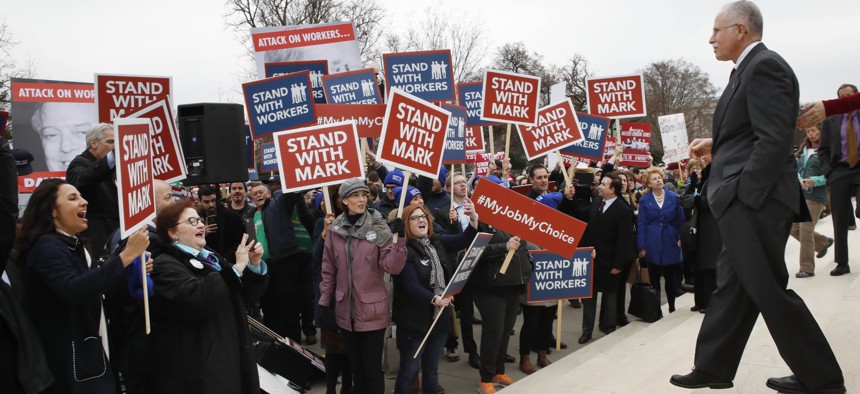Union Doesn't Need to Refund Fees to Local Government Workers, Federal Judge Rules

Supporters of Illinois government employee Mark Janus cheer as he walks to thank them, outside the Supreme Court, Monday, Feb. 26, 2018, in Washington. New legal disputes have arisen in the wake of the Supreme Court's decision in the case last year. AP Photo/Jacquelyn Martin

Connecting state and local government leaders
The lawsuits against a California union local are just two of many being filed against public sector unions across the country.
A federal judge in California has rejected attempts by local government employees to obtain years worth of refunds for fees they paid to a union before the U.S. Supreme Court in 2018 declared the paycheck deductions to be unconstitutional.
The rulings in favor of the union come amid a slew of lawsuits against public sector labor groups across the U.S. in the wake of the Supreme Court’s decision last June in Janus v. American Federation of State, County, and Municipal Employees, Council 31.
State and local public workers who opt to not join a union that represents the workforce they’re apart of cannot be forced to pay “agency” or “fair share” fees, under the ruling. The fees were meant to help with union operational costs, but not political advocacy.
The pair of cases in which the recent rulings were issued—Bermudez v. Service Employees International Union, Local 521 and Hough v. Service Employees International Union Local 521—have unfolded in U.S. District Court for the Northern District of California.
In both, workers were seeking refunds for themselves and similarly situated employees for fair-share fees they’d paid to SEIU Local 521.
As of the time the cases were filed last summer, the plaintiffs held local government jobs in Santa Clara County, California, Jorge Bermudez with the county’s Department of Employment and Benefit Services and William Hough with a transportation authority there. Two other county employees later joined Bermudez in his lawsuit.
Hough received legal representation from lawyers affiliated with the National Right to Work Legal Defense Foundation, a group that also aided Mark Janus, the Illinois child welfare specialist who was the plaintiff in last year’s Supreme Court case.
U.S. District Judge Vince Chhabria issued a ruling in the Bermudez case on Tuesday.
The judge said that because the fees Bermudez wanted refunded were paid over three years before filing his lawsuit—prior to him joining the union for several years beginning in 2015—his claims were “time-barred” due to a two-year statute of limitations.
But even if this was not so, the judge said the Janus ruling “does not entitle him to a refund.” The defendants in the case, he wrote, which included the union and the county, had demonstrated “good-faith reliance” on the law as it stood before the Janus ruling.
Chhabria also says “there is a strong argument that when the highest judicial authority has previously deemed conduct constitutional, reversal of course by that judicial authority should never, as a categorical matter, result in retrospective monetary relief based on that conduct.”
“Perhaps that’s why the Supreme Court did not address whether Mr. Janus himself was entitled to the refund he sought, instead simply remanding for further proceedings,” the judge adds.
Mullissa Willette, an exemptions investigator in the Santa Clara County Assessor’s Office, and first vice president of SEIU Local 521, in an emailed statement said the Bermudez lawsuit “is straight out of the playbook of the National Right to Work Foundation."
"Which is one of many front groups for wealthy billionaires who want to divide us and weaken our union," she added.
An attorney for the National Right to Work Legal Defense Foundation involved in the Hough case did not respond to emailed requests for comment. A message to another staff member with the group also went unreturned. One of the lawyers that represented Bermudez did not respond to phone and email requests for comment.
There’s a case management conference scheduled in May to discuss how to proceed with addressing still outstanding issues in the lawsuit brought by Bermudez.
The language regarding refunds in this week's ruling mirrored a March 20 order Chhabria issued in the Hough case—though statute of limitations issues weren’t in play there. Hough’s lawyers on Wednesday appealed the ruling to the U.S. 9th Circuit Court of Appeals.
Bill Lucia is a Senior Reporter for Route Fifty and is based in Olympia, Washington.

NEXT STORY: America’s Tech Hubs Still Dominate, But Some Smaller Cities Are Rising





